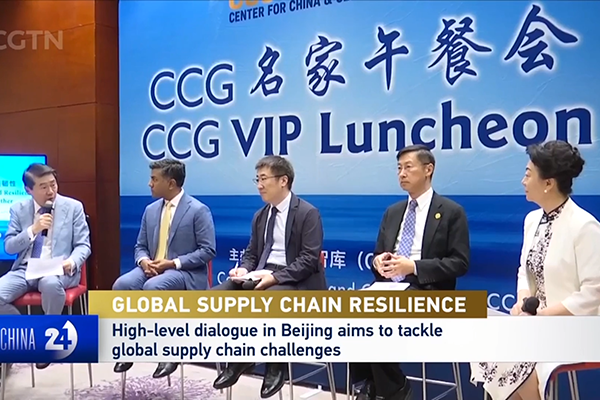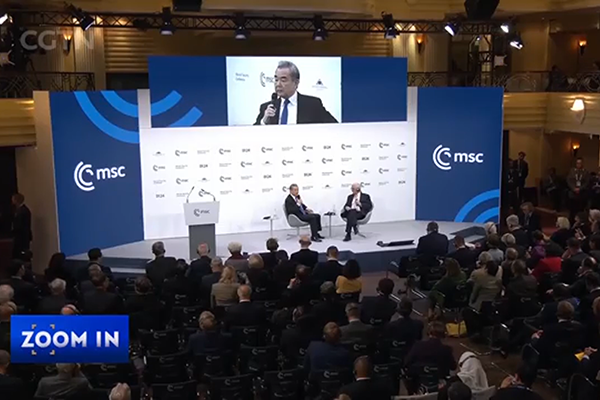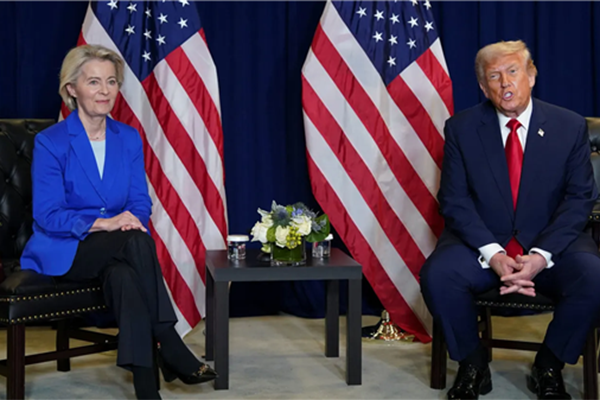Asia Times: Interview with editor of ‘Consensus or Conflict’
October 12 , 2021
Wang Huiyao is co-author of ‘Consensus or Conflict? China and Globalization in the 21st Century,’ along with Alistair Michie. Photo: AFP / Nicholas Kamm
He spoke with Asia Times editors via teleconference on October 8. Below is an edited transcript of the conversation. To read more on his book,
click here.
Asia Times: First of all, tell us about your organization. Give us a bit more of a personal sense of the CCG, what it is and what your role is. And then tell us also a little bit about how this book came together and what prompted you to put it together.
Huiyao Wang: Dr Miao and I founded the Center for China Globalization about 13 years ago, which is when China actually opened more. We felt that globalization was really going to affect China, and maybe there should be a think tank to look at those issues regarding China and the relationship between China and the outside world.
Asia Times: In the 13 years that CCG has been operating, you have had a chance to meet many American scholars, think tank people and so forth. Do you have an impression of the Biden administration and its senior staff? I’m sure that you’ve been in contact with many of these people. How does China view the Biden administration? Are you hopeful that a dialogue with the Biden administration might lead to a better consensus?
Huiyao Wang: Absolutely, I do think so. Recent developments are really fascinating. I was at the Munich Security Conference last year, and I invited John Kerry to my roundtable. He was very straightforward and he’s really focusing on collaboration on climate change. And he has been twice to China already, the only senior official of the US who landed in China. There was a telephone conversation between President Xi and President Biden. And then in that conversation, it was said, “Let’s instruct our working level to meet and talk again.” We had USTR officials, Treasury and Commerce. Everybody is coming out to talk about China policy and we have the meeting of Jake Sullivan and China’s top diplomat, who met in Geneva just yesterday.
So I think there are some positive things going on. I think that the problem is that the Trump administration has [caused so much] damage. There’s already a bipartisan consensus on China. China is a scapegoat for everything that’s not going well in the US. The problem is that you have the midterm elections coming up next year and [Democrats] have only a one-vote majority in the Senate, and they are sensitive to this issue.
I think President Xi and President Biden know each other very well. They spent over 20 hours together, eight or nine meals together, traveled on planes together and talked together through only a single interpreter. If they meet again as scheduled at the end of the year, they’re going to meet virtually. At least they’re going to have a summit, a virtual meeting, rather than a telephone call.
You know that we have a new Japanese Prime Minister. The president just called him today.
So we hope that the situation can be stabilized a little bit. With respect to China, Madame Meng has been released from Canada. We got rid of this sole point that was poisoning the relationship. So I’m actually looking at a bit of stability under the Biden administration, compared to the destabilized situation during the Trump administration. But I can’t say, after President Biden, what’s next. I really hope the people in America will see that China is not a threat.
During a recent conference, I was talking to [Harvard Professor] Graham Allison, [Harvard Professor] Joseph Nye, [Financial Times columnist] Martin Wolf and [New York Times columnist] Thomas Friedman for two hours. They don’t think that we should have a Cold War. They think we shouldn’t decouple, and that view is already reflected in the Biden administration policy: No Cold War, no decoupling. We should really build up this consensus, work together. We would probably see some stability.
The structural problems are still there. But how we can manage the risk, how we can control that and not let it get out of hand, is really the most important. I think we will gradually accept each other – as Joseph Nye told me, by 2035-2050. We really need to manage our risk of conflict. And I think that’s the way to go. We can’t really totally converge. But we can peacefully coexist. We’re two different cultures. I think that the world probably can have a different model to coexist. It’s not the end of the world. So I hope for a kind of process that will take maybe one generation or two generations to get to understand and then finally accept each other. I hope, really, that we can exist peacefully together.
Asia Times: Many people have said that data is the fuel of the fourth industrial revolution. If artificial intelligence is the engine, then data is the fuel. China has enormous advantages in data in many fields – for example, medical. But there is a risk of data protectionism in the 21st century, just as we had oil protectionism in the 20th century.
Huiyao Wang: Data is the petroleum of the 21st century, and you really need to make it flow before you can do well. It’s just like capital, or talent. China is sitting on a gold mine of data. It has a billion smartphone users. It has the largest number and variety of applications because it has a large population, has larger geography. Parts of China can develop. Why can’t that be applied elsewhere? We have to really use that data for the purposes of mankind. This thing is still debated, philosophically, ethically and technically in many ways. We have to reach a conclusion on that. That’s the usefulness of a book like this. We have experts to talk about this, and we have to discuss it in China as well. For example, China last year issued eight rules on data flow and data protection. Those are good examples of how we can push the consensus forward.
Asia Times: Let’s take the pandemic and what has been learned. You know what China has learned with its very successful policy. Not everybody agrees with this zero-tolerance policy. All of that is based on a wealth of data that have been collected. There must be some way of sharing that right because ultimately the pandemic is a global phenomenon and dealing with it is a global matter.
Huiyao Wang: I think that’s a good question. China was struck by the peak of Covid-19 last year and developed this vast system, with quarantine, testing, and tracing. They developed all kinds of technology, and they used data as a very good tool to do that. So that shows how effective they can be if they use the data to single out any Covid-19 cases. Then they can quickly stop the spread.
This data approach, though, has been really widely used in China because China’s philosophy and Chinese culture support it. In China, people don’t really regard individual freedom or individual human rights as the top community interest. What is on top is the collective effort. For example, if I’m locked down, cannot go out, even if I lose my individual freedom, the whole society benefits from that. That’s why I think the data and technology are there but they may not work elsewhere. There are pros and cons to this approach, and there’s a balance in each society. In China, the government can do that because this society is very cooperative and people really have trust in the government.
The same data approach might not work in a Western society. The West views governance as a necessary evil and never, never really trusts it. China has had a collective society for 5,000 years. Despite what people think, it’s not a matter of the communist system. It’s a different philosophy, a different culture and a different mentality, in which some technology works well.
Asia Times: The United States seems to think that it can make up the rules and everyone has to abide by these rules. But China also has sometimes done that. It makes up a map and it says, OK, fine, this is our territory. But what international rules and regulations do we want? Where do we go with this?
Huiyao Wang: When we talk about the rules-based order, what was referred to is the Bretton Woods conference in 1944 and the founding of the United Nations. The World Bank, IMF, GATT – all those institutions were born at that time. The world has gone on like that for 75 years, but the parameters have greatly changed. Then China was a tiny percentage of global trade or global GDP, and now it has become the second-largest economy. The old rules-based order doesn’t reflect the new reality. So I think that is where we need to make some innovations, some updates. We’re not saying we’ve abandoned the order. We may say maybe we can upgrade or improve that. We have these new institutions like the Asia Infrastructure Investment Bank. These new institutions, which have a new global role, need new norms and new regulations. Another thing is the TPP [Trans-Pacific Partnership]. We need now the next generation of 21st century standards for trade and service rules.
Asia Times: The COP26 summit is coming up at the end of the month and the beginning of November in Glasgow. One of the challenges that we are facing is to deal with the climate issues, but at the same time, to do it in such a way that it does not destroy our political and economic structure. In China right now, you are sliding into an energy crisis perhaps because of some premature cutbacks on energy production.
Huiyao Wang: China said that it will reach peak carbon before 2030 and then carbon neutrality before 2060. On the one hand, you know, China is a developing country. You may say that China can’t do it. But China already realizes that it has enough smog. So they have cleaned up a lot of things. China is already now the largest clean-energy automobile producer, largest wind-power producer and largest hydropower producer. Environmental needs are pushing China to be more innovative and to spend more resources on those new technologies.
On the other hand, we have to follow the logic and the rhythm of development. China really has to cut down energy consumption per GDP unit. But of course, it’s a gradual process. And recently China has stopped building thermal power plants overseas, which is a huge commitment. But we will not jeopardize the economy. That’s the beauty of the Chinese system. If things go a little wrong, that government could switch back.
China never really has any big crisis because the government is very efficient and very effective in controlling those crises. So I think that system is really working well from some insider’s point of view.
Asia Times: Professor Phelps has written for Asia Times extensively, and he’s an economist whose ideas we follow closely. The emphasis in his contribution to your book is on indigenous innovation. He talks about the shift in focus from made-in-China to created-in-China. And he says this is essential to continuing growth and transformation. Of course, innovation is a very difficult thing to measure. I was wondering if CCG has done any studies on the state of indigenous innovation.
Huiyao Wang: Particularly after this trade war and the sanctions on Chinese companies, we’re really fortunate to do a lot of indigenous innovation. In the past companies thought they didn’t have to innovate because they could come by all the technology they needed from overseas. They thought that David Ricardo’s competitive advantage was really great and everyone should do what he does best.
Now this is a geopolitical decision for China to be more innovative. We have made enormous leaps. We went from having no phones to having smartphones. We have 4.7 million 4G stations, and almost one million 5G stations, and that’s supported a lot of innovation.
So we expect China to become more innovative, and to have more productive manufacturing as a result. It makes no sense to sanction China and no sense for China to retaliate with sanctions. I think we should really, really depend on each other and recognize everybody’s advantages and overcome disadvantages.
Asia Times: Dr Wang, thank you very much for this conversation.
From Asia Times, 2021-10-12
[Book Introduction Video]
Download Book at Springer
https://link.springer.com/book/10.1007/978-981-16-5391-9
Browser, Download & Buy Book at Amazon.com:
https://www.amazon.com






